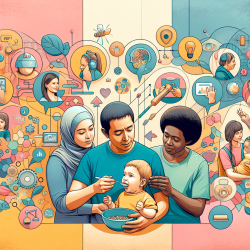Feeding difficulties are a significant concern for children with cerebral palsy (CP) and their caregivers. A recent study titled Caregivers’ Feeding Experiences and Support of Their Child with Cerebral Palsy provides valuable insights into the challenges faced by caregivers and offers guidance for practitioners aiming to improve support and outcomes for these families.
The study utilized a qualitative approach, conducting semi-structured telephone interviews with eleven mothers of children with CP. Thematic analysis of the interviews identified four major themes:
- Child-centred world: Caregivers prioritize their child's health, safety, and development, often experiencing stress and worries around feeding.
- Making decisions: Daily feeding decisions are made through problem-solving, seeking information, and trial and error.
- Knowing their child: Caregivers develop expertise in managing their child's unique feeding needs and medical conditions.
- Seeking and receiving support: Support from family, health professionals, and social networks varies, with some caregivers feeling isolated or unsupported.
Practitioners can enhance their support for caregivers by adopting the following strategies:
- Individualized Partnership Approach: Tailor support to the unique needs of each child and caregiver, recognizing their expertise and involving them in decision-making.
- Timely and Specific Advice: Provide practical, actionable advice on feeding techniques and interventions that address the specific challenges faced by the child and caregiver.
- Respect and Empathy: Listen to caregivers’ concerns, validate their experiences, and show respect for their knowledge and efforts.
- Flexible Support Options: Offer a range of support strategies, including home visits, telehealth services, and connecting caregivers with relevant social networks and support groups.
Implementing these strategies can help practitioners create a supportive environment that reduces caregiver stress and improves feeding outcomes for children with CP. For those interested in further research, exploring the experiences of caregivers from diverse cultural backgrounds and those in rural or low-resource areas can provide additional insights into effective support strategies.
To read the original research paper, please follow this link: Caregivers’ Feeding Experiences and Support of Their Child with Cerebral Palsy.










